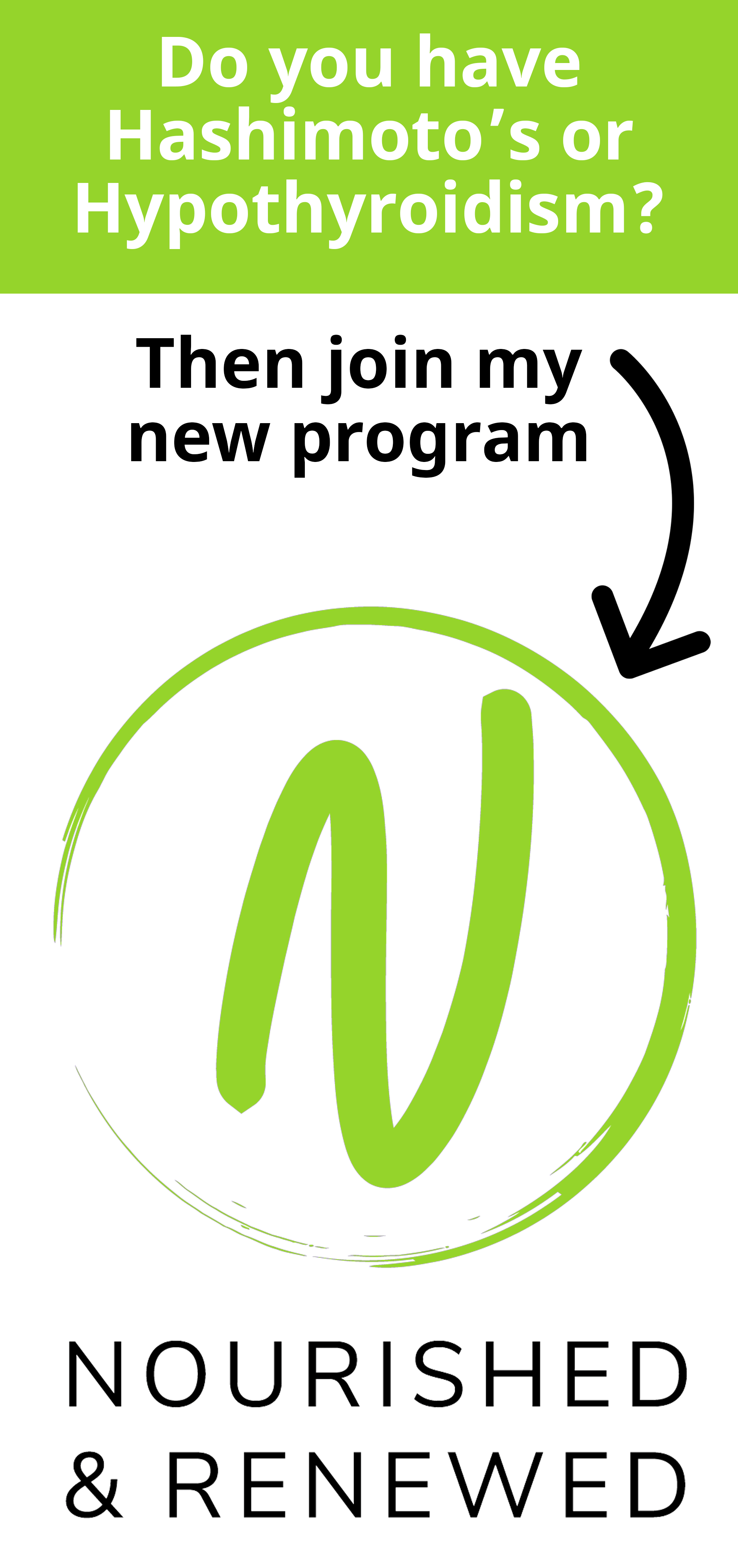Perhaps there is nothing more common but misunderstood than thyroid disorders like Hashimoto's and hypothyroidism. Everyone these days seems to know someone who has struggled with thyroid health… or has struggled themselves.
But the causes and “fixes” for those issues still seem to elude many of us.
How can the thyroid, a major gland that is critical to a number of body functions but that seems to inadequately work for so many still be so mysterious?
For one, there are a number of hormones to consider and tests to look at.
But too often, only one of those hormones is tested and it may not be often enough information to go on.
And many people want the “magic bullet” medication that will fix it all.
But I am a firm believer in a combination of medication and dietary changes to create a holistic approach to balancing your thyroid health.
This article is a complete guide for you to understanding all about Hashimoto's and hypothyroidism and recommended thyroid testing to help you diagnose and navigate through your journey and restore your health.
Meet Annette.
Annette is in her mid-40s and is married with two kids in high school. She has been feeling very rundown for the last year or so. Even when she is consistent about working out, she seems to keep putting on weight.
And, although she has always gotten compliments on her thick, luscious hair, it seems to be thinning lately and looking pretty flat.
She was concerned there was something going on so she went to her general practitioner, who ran some tests.
The tests came back and her doctor told her that her thyroid hormone level came back normal. He told Annette that she just needs to get more sleep and maybe take a multivitamin.
Annette has had a number of family members tell her that it’s either all in her head and she’s fine, or that this is just part of ageing.
But she’s certain it’s not that simple and that surely there’s more that can be done. She decides to go see an endocrinologist to get to the bottom of what’s going on in her body.

What Is Hypothyroidism? Is It the Same as Hashimoto’s?
Even if you’ve talked to your doctor about your thyroid, or received a diagnosis, you may not fully understand how the thyroid works and what hypothyroidism is.
The Role of the Thyroid
The thyroid is a gland, meaning it excretes hormones, located in the neck. The main purpose of the thyroid is to regulate metabolism, including how we metabolize food and regulate body temperature.
It does this with a feedback system that relies on hormones, such as thyroid stimulating hormone (TSH) that the brain’s pituitary gland produces in order to trigger the thyroid to excrete T3 and T4.
T3 (triiodothyronine) is an active form of the thyroid hormone, while T4 (thyroxine) is the inactive form. These are what actually change the rate at which the body uses energy (metabolizes).
When the Thyroid is Not Functioning Properly
Hypothyroidism is when the thyroid cannot offer up enough of these hormones to function normally. (Inversely, hyperthyroidism is when the thyroid over-functions and makes too much of the hormones.)
In more extreme cases, hypothyroidism can lead to goiters (swelling in the neck) as the thyroid increases in size to try to create more hormones.
It is believed that nearly 5% of the population suffers from hypothyroidism but it is much more common in women. As many as 1 in 10 women have this condition.
What Is Hashimoto’s and How Is It Different from Hypothyroidism?
Hashimoto’s Thyroid Disease and hypothyroidism have that a-square-is-always-a-rectangle-but-a-rectangle-is-not-always-a-square thing going on.
The most common cause of hypothyroidism is Hashimoto’s but having hypothyroidism doesn’t necessarily mean you have Hashimoto’s.
Hashimoto’s is an autoimmune disorder.
Autoimmune means the body is attacking itself or something in the body that shouldn’t normally be a threat.
In the case of Hashi’s, the immune system is actually attacking the thyroid or thyroid proteins.
When the thyroid is attacked, it cannot adequately function and make enough hormones, leading to hypothyroidism.
But you can have other causes of low thyroid hormone levels, hence the rectangle not being a square.
When you have Hashimoto’s, the immune system creates specific antibodies.
Tests can measure these antibodies, leading to a Hashi’s diagnosis. It is believed that about 90% of hypothyroidism is caused by Hashimoto’s.
Signs, Causes and Risks of Hypothyroidism
Unfortunately, hypothyroidism is often under diagnosed because many of the symptoms are common or seem to indicate a different issue.
And as with many health disorders, not everyone experiences them the same way.
The most common signs of hypothyroidism are:
- Fatigue
- Weakness
- Weight gain or increased difficulty losing weight
- Coarse, dry hair
- Dry, rough, pale skin
- Hair loss and thinning of eyebrows (especially outer third of eyebrows)
- Low tolerance to cold
- Muscle cramps and frequent muscle aches
- Constipation
- Depression
- Irritability
- Memory loss
- Abnormal menstrual cycles
- Decreased libido
Not too surprising then that all of these are also symptoms of Hashimoto’s disease. Unless specifically tested for, many doctors may pinpoint hypothyroidism and not delve deeper.
There are risk factors for hypothyroidism but there is no one cause of it.
Instead, we know that there are a number of factors that can increase your chances.
As I mentioned, women are more likely to have hypothyroidism and Hashimoto’s.
And with any autoimmune disorder, once you have one, you are at much higher risk to develop more.
The most common forms of autoimmune disease in those already diagnosed with Hashimoto’s are arthritis, connective tissue disease (such as Sjogren’s syndrome), vitiligo and celiac disease.
There are indications that some factors of Hashimoto's may include:
- Genetic influences, especially MTHFR mutations
- Environmental exposures, including food antigens
- Pesticides and environmental chemicals, including glyphosate
- Deficiencies in total body nutrients that result from improper diet, toxic overload, or autoimmune disease
- Other hormone imbalances, such as reproductive hormones (estrogen/progesterone/testosterone), the adrenal glands (cortisol/adrenaline/noradrenaline/aldosterone) or other regulatory hormones (insulin, etc.)
- Lack of digestive integrity and increased permeability of the gut wall allow for foods and pathogens to enter the bloodstream where they shouldn’t
If you have hypothyroidism but not Hashimoto’s, what else could have caused it?
Some medications are known to contribute, including lithium (used for some psychiatric disorders)
- Radiation therapy
- Over-response to hyperthyroidism treatment
- Pituitary disorder (this affects communication between the glands)
- Congenital thyroid disease (infants born with thyroids that are not fully functioning)
- Surgical removal of all or part of the thyroid
- Pregnancy and hormonal imbalances or conditions such as polycystic ovarian syndrome (PCOS)
- Iodine deficiency
Testing Thyroid Hormones
Anyone with questions about their thyroid health has likely had some tests run. But were they testing the right hormones? And getting them tested often enough?
What is TSH and Why Does It Matter?
Most doctors will test the levels of TSH (thyroid-stimulating hormone), the hormone from the pituitary gland that triggers the thyroid.
Levels are generally considered healthy if they run between 0.4 milliunits per liter (mU/L) and 4.0 mU/L.
But this is a very large range and someone can be technically still in that range but feeling lousy. (Some functional doctors say the optimal range is between 1.0 and 2.5 mU/L.)
Also, we know that TSH does not tell the whole story. This is especially if the pituitary gland is functioning well but the thyroid is not.
First of all, the only way to know for sure if you have Hashimoto’s disease is to test for the antibodies created when the immune system attacks the thyroid, thyroglobulin.
Are TSH tests helpful at all? Absolutely!
TSH shows how hard the pituitary gland is working to send a signal to the thyroid to make more thyroid hormones.
A high TSH indicates the thyroid gland may be sluggish and not producing enough hormones.
On the other side, a low TSH means the thyroid is pumping out more than enough hormone and the pituitary is not sending much of a signal at all anymore.
TSH is affected by medication so it can be used as one indicator for if medication dosages are working for you.
Hashimoto’s or not, if you believe you may suffer from hypothyroidism but your TSH levels appear normal, there are a number of other tests to consider.

Thyroid Hormones and Other Labs That Can Be Tested Too
You can ask your doctor or endocrinologist to test your Free T3 and Free T4 levels.
This gives a better scope of how well the thyroid is making hormones and how well they are being converted to an active and usable form.
Additionally, tests that look at your Reverse T3 (a metabolite of T4), sex hormone-binding globulin (a liver protein that binds to sex hormones), or ferritin (an iron-containing protein) can also give an idea of what’s really going on.
If you are having trouble communicating the need for these tests with your doctor, or if insurance approval is standing in the way, you can order these labs yourself.
Yes, really!
I suggest the following lab panel (that includes all of the above lab values) for the clients I work with remotely: Extended Thyroid Test for Hashimoto's Thyroiditis. It costs just $129 but is valued at over $400.
The good folks at True Health Labs allow you to directly order labs that make the most sense for your health condition, allowing you to better participate in the overall management of your health.
If you do order these labs, be sure to take them with you to your next provider appointment.
Show them that you are willing to do what it takes to get the correct information for the best treatment plan possible.

How Lab Tests Can Help With Supporting Your Thyroid Health
When Annette had gone to her doctor, he said her TSH levels were within a healthy range at 3.5 mU/L. But when she went to an endocrinologist, she was told that was in the high range and also had her Free T3 and Free T4 levels tested.
These tests indicated a sluggish thyroid and was given a hypothyroidism diagnosis. She had heard about Hashimoto’s Disease and when she asked about it, her endocrinologist agreed that it was worth testing for.
She tested positive for thyroid antibodies, giving her a Hashimoto’s diagnosis as well.
Although it was a little scary for Annette, she was also relieved to know that she was getting to the bottom of what was going on.
Ideally, you would get your TSH, Free T3 and Free T4 tested once or twice per year.
However, if you are working with your provider to adjust medication dosages in order to find the right amount, I suggest testing every six weeks.

What Providers Can Help You Manage Your Thyroid Health
Speaking of providers, you may wonder if an endocrinologist is in order and I do highly recommend seeking one out.
An endocrinologist can help you get a baseline on the health of your thyroid and may offer a thyroid ultrasound.
These are also the best kind of doctors to manage your thyroid medications.
A DO (Doctor of Osteopathic medicine), family practice doctor or integrative medicine doctor may also be good options. And many are willing to work with nutritionists to create conducive plans together.
In addition, certain holistic practitioners can also be part of your thyroid support team as well.
These can include acupuncturists, naturopaths and, of course, nutritionists, especially if they are board certified in holistic nutrition.

What Can Be Done For Hashimoto’s the Hypothyroidism
Some people think that because I am a nutritionist, I am against medicating for thyroid disorders. On the contrary!
Medications have been life-changing for me in my own thyroid journey.
But they have always been just one piece of the puzzle and I try to help my clients realize this as well.
Medication, when paired with a nutrition plan, lifestyle changes and stress management, can have huge impacts on your thyroid health.
Medicating For Your Thyroid
The first thing to understand about medication is that there is no right one for everyone. There are many types, including:
- Synthetic - a man-made, synthetic form of a specific hormone, meant to imitate the actions of that hormone
- Natural desiccated - made from dried thyroid gland from other animals (usually pig or cow)
- T3-only forms - contains only the active T3 form of thyroid hormone
- Compounded - combined thyroid hormones meant to be tailor-made based on your needs
Choosing the right one depends on your unique biochemistry, which is why working with an endocrinologist or similar doctor can take time but can also help you find the perfect match.
Thyroid Surgery
Studies have started to look at whether total removal of the thyroid helps reduce symptoms of Hashimoto’s.
And although when compared with medication alone, surgery to remove the thyroid has had some promising results, these studies haven’t considered when you do more than just medicating.
Surgery may still be an option for you but it should be a last resort. Always talk to your doctor about all your options and consider making dietary protocols part of the plan.
How Nutrition and Lifestyle Help the Thyroid
You may wonder why anything more needs to be done if you are taking a medication. And you may ask what diet has to do with something in your thyroid (and brain).
Stress
For one, stress has a huge impact on thyroid function and is known to be a factor in many autoimmune diseases.
Many clients report that stress management plays a large role in the management of their thyroid health as well.
This comes in many forms for many people: walks around your neighborhood, meditation, yoga, self-care or “me time,” talk therapy or something completely different.
Toxins
Another lifestyle change that can influence your thyroid is eliminating or reducing exposure to toxins, such as heavy metals, pesticides and herbicides, BPA, phthalates, parabens and more.
Most of these are known to impact hormone levels, not always in an immediate way but after long-term exposure.
Heal the Gut
Gut health is actually crucial for our thyroids because healthy gut bacteria aids in the conversion of the T4 hormone into the active T3.
Hormone Balancing
Also, when one hormone-producing gland gets out of whack, it is very common for other glands to begin to function poorly. This can (and does) include the adrenals, which produce stress hormones, and the testes or ovaries, which produce sex hormones.
So when you eat foods that support one gland, you are in turn supporting all your glands.

Choosing the Thyroid Path That is Right for You
Annette worked with her endocrinologist to find the right medication that would work for her needs, based on her T3 and T4 levels, as well as the Hashimoto’s.
She also found a holistic nutritionist, who was able to make dietary recommendations that worked well with her medications to balance her thyroid.
After tweaking the medications and diet for a few months, she found that her hair wasn’t thinning as much, she was able to maintain her weight and, best of all, she had more energy than she had in years.
It wasn’t an easy or super quick process. But she was willing to make the changes and stick with them in order to feel her best.
When people are diagnosed with hypothyroidism, they often assume they just have one possible plan: get on a medication and stick with it regardless of how they feel moving forward. That’s just the way life will be now.
But often, further testing will reveal more information, like a Hashimoto’s diagnosis. And even medication offers many different options these days.
Looking for Thyroid Support?
If you would like more support with your thyroid health and overall wellbeing, check out my 30-day Nourished & Renewed With Hashimoto’s program.
This is a self-paced online lifestyle program that offers tangible, realistic solutions for improving your Hashimoto’s and your overall health in a way that lasts.
If you are looking for personalized attention to your thyroid, seek out a program and thyroid advocate who can give you the tools and resources to feel your best again.
I would recommend my Happy & Healthy Adult Program for those with possible thyroid health issues.
There is so much that you can do to boost thyroid health and live your best life.
I hope that no matter your diagnosis and your medication plan, you will consider making nutrition and lifestyle changes part of your plan too.






